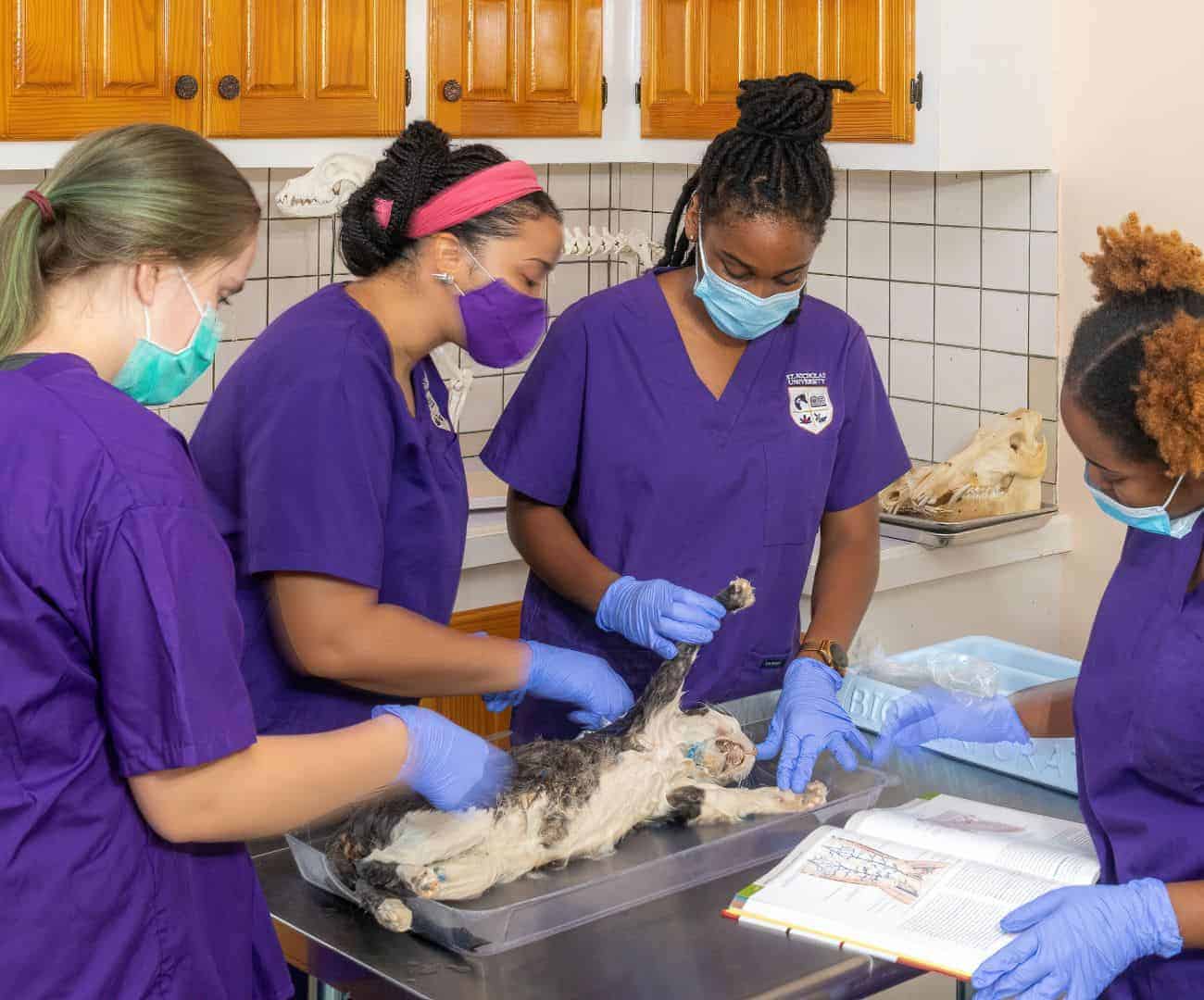Curriculum
St Nicholas University
| Veterinary Histology and Embryology | 4 |
| Veterinary Anatomy I | 4 |
| Veterinary Physiology I | 4 |
| Veterinary Bacteriology and Mycology | 4 |
| Veterinary Professionalism & Ethics | 2 |
| Veterinary Immunology and Virology | 4 |
| Veterinary Anatomy II | 4 |
| Veterinary Physiology II | 4 |
| Veterinary Parasitology and Tropical Diseases | 4 |
| Veterinary Biostatistics and Evidence Based Medicine | 2 |
| Veterinary General and Systemic Pharmacology | 4 |
| Veterinary Systemic Pathology | 4 |
| Veterinary Genetics and Molecular Biology | 4 |
| Veterinary Clinical and Surgical Skills I | 4 |
| Veterinary Principles of Animal Nutrition | 2 |
| Veterinary Preventative Medicine | 4 |
| Veterinary Clinical Pathology | 4 |
| Veterinary Public Health and Epidemiology | 4 |
| Veterinary Clinical and Surgical Skills II | 4 |
| Veterinary Behavior and Animal welfare | 2 |
| Veterinary Small Animal Medicine I | 4 |
| Veterinary Small Animal Surgery | 4 |
| Veterinary Reproductive and Theriogenology | 4 |
| Veterinary Clinical and Surgical Skills III | 4 |
| Veterinary Diagnostic Imaging | 2 |
| Veterinary Small Animal Medicine II | 4 |
| Veterinary Anesthesiology and ICU | 4 |
| Veterinary Large Animal Medicine and Surgery | 4 |
| Veterinary Chemotherapy and Toxicology | 4 |
| Veterinary Fisheries and Aquaculture | 2 |
| Veterinary Exotic Animal Medicine | 4 |
| Veterinary Farm Animal Medicine and Practices | 4 |
| Veterinary Meat Inspection and Necropsy | 4 |
| Introduction to Clinics | 4 |
| Veterinary Thesis and Research | 2 |
Curriculum Overview
Our curriculum integrates basic and clinical science to provide students the framework for integrating all of their accumulating knowledge to be applied to the clinical setting. The students develop their knowledge of all species in both normal and abnormal states, building their skills from basic coursework into the clinical applications. The veterinary graduate is equipped to not only treat diseases of animals but also to solve disease problems that affect both animals and humans. With the increase in frequency of zoonotic diseases and the focus on “One Health,” this is an increasingly important part of veterinary education.
Sensitivity to the human-animal bond has become a very important component of clinical veterinary medicine, and can have a major impact on the success of the veterinarian in a private practice setting. At Saint Nicholas University: School of Veterinary Medicine, we believe that learning to balance hard scientific skills with accomplished people skills is vital to the veterinarian’s success.
During the first seven (7) semesters, students participate in a series of basic and clinical sciences courses that provide the knowledge that will lead to success in the clinical application later in their clinical practice training. Relevance of basic science information to solutions of clinical problems is key to the educational process. Students learn the role of veterinary medicine in the community and the effect that disease has on animals and the family involved as well as the potential for transmission of zoonotic agents from animals to humans.
Each credit in the Veterinary Basic Science curriculum is equivalent to either 15 lecture hours or 30-45 laboratory session hours. Laboratory sessions provide the opportunity for students to develop the ability to make observations and improve their analytical skills. Also, some students learn more quickly in this “hands on” experience.
Clinical Rotations Curriculum (Term 8, 9, 10)
The final three (3) semesters of the program consist of a 45-week clinical curriculum, conducted at affiliated schools or colleges. Students are required to complete a minimum of 20 weeks in “core” clinical subjects including a minimum of four weeks each in small animal medicine, small animal surgery, and large animal medicine and surgery: and two weeks each in diagnostic laboratory, clinical anesthesiology, diagnostic imaging and diagnostic pathology. The remaining weeks of the clinical rotations program are made up of elective rotations (clinical rotations) and externships approved by the affiliated schools.
Plan Your Veterinary Future with SNU
Want to learn more about our DVM curriculum or Clinical Rotations Program? Schedule a personalized Google Meet with one of our specialist advisors to learn more about your future in veterinary medicine with SNU.


